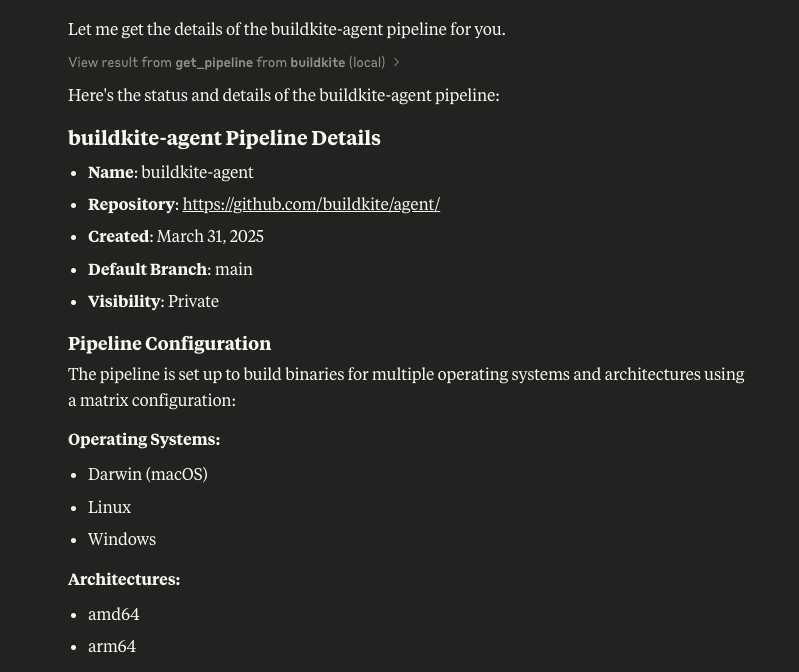This is an
get_pipeline- Get details of a specific pipeline in Buildkitelist_pipelines- List all pipelines in a buildkite organizationlist_builds- List all builds in a pipeline in Buildkiteget_job_logs- Get logs for a specific job in Buildkitelist_artifacts- List all artifacts for a specific job in Buildkiteget_artifact- Get a specific artifact for a specific job in Buildkitecurrent_user- Get details of the current user in Buildkiteuser_token_organization- Get the organization associated with the user token used for this request
Example of the get_pipeline tool in action.
Pull the pre-built image (recommended):
docker pull ghcr.io/buildkite/buildkite-mcp-serverOr build it yourself using GoReleaser and copy the binary into your path:
goreleaser build --snapshot --cleanCreate a buildkite api token with read access to pipelines.
Use this configuration if you want to run the server buildkite-mcp-server Docker (recommended):
{
"mcpServers": {
"buildkite": {
"command": "docker",
"args": [
"run",
"-i",
"--rm",
"-e",
"BUILDKITE_API_TOKEN",
"ghcr.io/buildkite/buildkite-mcp-server",
"stdio"
],
"env": {
"BUILDKITE_API_TOKEN": "bkua_xxxxxxxx"
}
}
}
}Configuration if you have buildkite-mcp-server installed locally.
{
"mcpServers": {
"buildkite": {
"command": "buildkite-mcp-server",
"args": [
"stdio"
],
"env": {
"BUILDKITE_API_TOKEN": "bkua_xxxxxxxx"
}
}
}
}For Docker with
extensions:
fetch:
name: Buildkite
cmd: docker
args: ["run", "-i", "--rm", "-e", "BUILDKITE_API_TOKEN", "ghcr.io/buildkite/buildkite-mcp-server", "stdio"]
enabled: true
envs: { "BUILDKITE_API_TOKEN": "bkua_xxxxxxxx" }
type: stdio
timeout: 300Local configuration for Goose:
extensions:
fetch:
name: Buildkite
cmd: buildkite-mcp-server
args: [stdio]
enabled: true
envs: { "BUILDKITE_API_TOKEN": "bkua_xxxxxxxx" }
type: stdio
timeout: 300.vscode/mcp.json
{
"inputs": [
{
"id": "BUILDKITE_API_TOKEN",
"type": "promptString",
"description": "Enter your BuildKite Access Token (https://buildkite.com/user/api-access-tokens)",
"password": true
}
],
"servers": {
"buildkite": {
"command": "docker",
"args": [
"run",
"-i",
"--rm",
"-e",
"BUILDKITE_API_TOKEN",
"ghcr.io/buildkite/buildkite-mcp-server",
"stdio"
],
"env": {
"BUILDKITE_API_TOKEN": "${input:BUILDKITE_API_TOKEN}"
}
}
}
}Notes on building this project are in the Development.md
This project is in the early stages of development and is not yet ready for use.
This project is released under MIT license.
